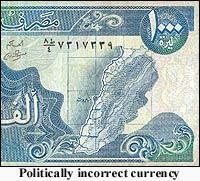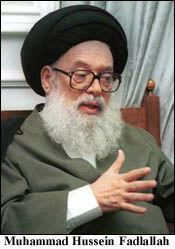 |
| Vol. 3 No. 6 | Table of Contents MEIB Main Page | June 2001 |
Hezbollah Deploys Strella Anti-Aircraft Missiles
According to a Hezbollah communiqué quoted in the Lebanese media on June 13, the militant Islamist group has fielded units equipped with Soviet-built SAM-7 and SAM-9 anti-aircraft missiles, commonly known as Strella missiles, to confront intruding Israeli aircraft. According to Al-Nahar (Beirut), two of the shoulder-held missiles were fired at Israeli aircraft flying separate sorties near Tyre on June 12. This was the first Hezbollah attack on Israeli aircraft since the withdrawal of Israeli forces from south Lebanon in May 2000. The missiles are not considered to be a serious threat to Israeli pilots, who have been trained to deflect the missiles by releasing heat balloons.
 |
Jumblatt: "the Shebaa Farms are not Lebanese"
On May 27, the Sawt al-Shaab radio station quoted Lebanese Druze leader Walid Jumblatt as saying that "the Shebaa Farms are not Lebanese" and calling for "respecting UN Security Council resolutions 425, 242 and 338, and the [UN-demarcated] blue line" in south Lebanon. Jumblatt, who made the remarks in a speech to members of the Lebanese community in the United Arab Emirates, later claimed that the comments were quoted out of context and stressed that "all Arab land should be liberated."
Syria Acknowledges Presence of 1 Million Workers in Lebanon
Syria's state-run Al-Thawra newspaper dropped a bombshell on June 12, acknowledging the presence of one million Syrian workers in Lebanon. Although the presence of up to 1.4 million Syrian workers in the country, concentrated in the construction and agriculture sectors, is common knowledge, the revelation is nevertheless striking because the Lebanese Ministry of Labor officially lists only 530 Syrians with valid work permits. The unregulated flow of cheap Syrian labor has contributed to extremely high unemployment in Lebanon. [See Syrian Workers in Lebanon: The Other Occupation, Middle East Intelligence Bulletin, February 2001]
 |
Mansour: Charges against Aoun are an "Illusion"
Former Defense Minister Albert Mansour said on June 10 that claims by security and judicial sources in the Lebanese government that former Prime Minister Michel Aoun was guilty of financial embezzlement during his 1988-1990 tenure in office were merely an "illusion." Speaking on Sawt al-Shaab radio station, Mansour also criticized the "intensive" role played by security agencies in Lebanon.
Berri, Lahoud Threaten Retaliation if Israel Strikes Syrian Army
Lebanese Parliament Speaker Nabih Berri and President Emile Lahoud simultaneously announced last month that civilians in northern Israel will come under attack if Israel strikes at Syrian military forces stationed in Lebanon. "We simply declare that any Israeli attack on the Syrian army in Lebanon will be viewed as an aggression against the resistance, which will consequently get the right to strike at all Jewish settlements in northern Israel," declared Berri during a May 25 speech marking the first anniversary of Israel's withdrawal from south Lebanon. Meanwhile, Lahoud told the London-based weekly Al-Wasat: "If Israel hits again at Lebanon or at Lebanon-based Syrian troops in what it calls the new equation, its northern flank will be in peril in a counter-equation of our own."
This was the first time that Lebanese officials have directly threatened Israeli civilian settlements. Previous threats along these lines have been voiced only by Hezbollah officials. Israeli jets destroyed a Syrian radar station in central Lebanon on April 16.
Fransabank Predicts 1% GDP growth in 2001
In its first-quarter report released on June 11, Fransabank predicted that Lebanese GDP will grow by a mere 1% in 2001, a significantly lower estimate than the Central Bank's forecast of 3-4%. The report warned that the government's chronic budget deficits threaten to erode domestic and international confidence in the Lebanese economy. "The normalization of public finances will be the single most important factor influencing Lebanon's medium term prospects," the report said.
S&P Downgrades Local Currency Rating for Lebanon
On May 25, Standard & Poor downgraded its long-term local currency rating for Lebanon from BB- to B+, a decision which reflects the international rating agency's view that Lebanese government-issued T-bills, which finance around 70% of its $24 billion public debt, are a speculative investment.
S&P said that one reason for the downgrade was the Lebanese government's inability to control the growth of its public debt. "Lebanon's ratings are likely to remain under downward pressure until there is a fiscal correction substantial enough to reverse the growth in the public debt burden," said the agency in a statement. The government has forecast a budget deficit this year of about 23 percent of Lebanese GDP, the largest of any country rated by the agency. The total government debt is expected to reach 160% of GDP by the end of 2001.